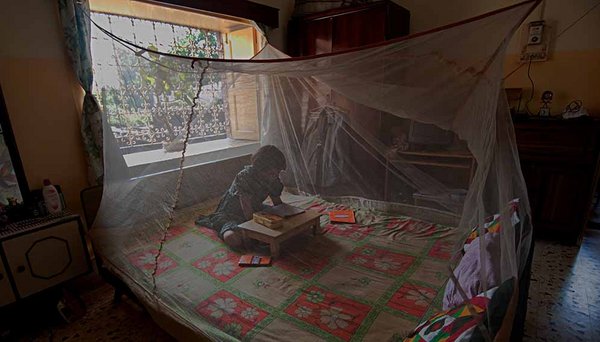 Read this article in French
Read this article in French- Share this article
- Subscribe to our newsletter
Natural mosquito fungus ‘could block spread of malaria’
Scientists have discovered a microbe, a fungus which they have named Microsporidia MB, in Anopheles arabiensis mosquitoes around the shores of Lake Victoria in Kenya. The fungus is capable of blocking malaria transmission from mosquitoes to people.
Malaria prevention and control organisations are optimistic that the findings could offer a lasting solution to malaria. The disease infects about 220 million people a year. The vast majority of malaria cases occur in Africa and India and are caused by the P. falciparum parasite carried by female Anopheles mosquitoes.
Focusing on P. falciparum, researchers from icipe, the International Centre of Insect Physiology and Ecology (icipe), based in Nairobi, Kenya, and the Scottish University of Glasgow reported in a study published on the 4th May that mosquitoes with the fungus do not carry malaria parasites, neither in nature nor after experimental infection in the lab.
The fungus Microsporidia MB is naturally found at low levels in malaria mosquitoes in Kenya, but the researchers believe there may be ways to increase the number of mosquitoes carrying it, thereby blocking their capacity to transmit malaria. Only female mosquitoes bite people.
Further research will investigate precisely how Microsporidia MB could be used to control malaria in large mosquito populations, but the researchers argue that it is scalable and could be delivered to remote areas via plane airdrops of lab-infected mosquitoes or spores.
The microbe is passed from female Anopheles arabiensis mosquitoes to their offspring at high rates and does not kill or cause obvious harm to the mosquito host, or affect its fitness.
It means that using the fungus to tackle malaria would leave mosquito populations intact, in contrast to techniques such as genome editing which could wipe them out.
“Maybe the first step is to look at what’s naturally out there and see if that can work,” lead author of the study Jeremy Herren, from icipe and formerly the University of Glasgow, told SciDev.Net.
Support and scepticism among health and environmental organisations
Organisations like the non-profit Malaria Consortium and Medicines for Malaria Venture believe the discovery of Microsporidia MB could be good news. However, further studies are needed to confirm the findings with larger samples of mosquitoes and in other important mosquito species.
Nevertheless, ecologists remain wary of the potential environmental and public health consequences. Experts from ETC Group, a conservation and technology non-profit organisation, are urging caution about the discovery. While Microsporidia MB is a naturally occurring biological organism, the ecologists warn that whenever you release something as a biological control agent you don’t know what’s going to happen. “We don’t know ecologically what it might do to pollinators or other organisms that are key parts of ecosystems,” they say.
Yet Herren says his research indicates that Microsporidia MB does not have the capacity to infect other organisms. “Probably there is a risk in anything, but I think in this case it would be very small, if you’re taking something that is already there and you’re increasing the prevalence,” he says.
(SciDev.Net/wi)
Original study: Jeremy K. Herren et al.: A microsporidian impairs Plasmodium falciparum transmission in Anopheles arabiensis mosquitoes Nature communications, 11, article number 2187 (2020) 2187 (2020)


